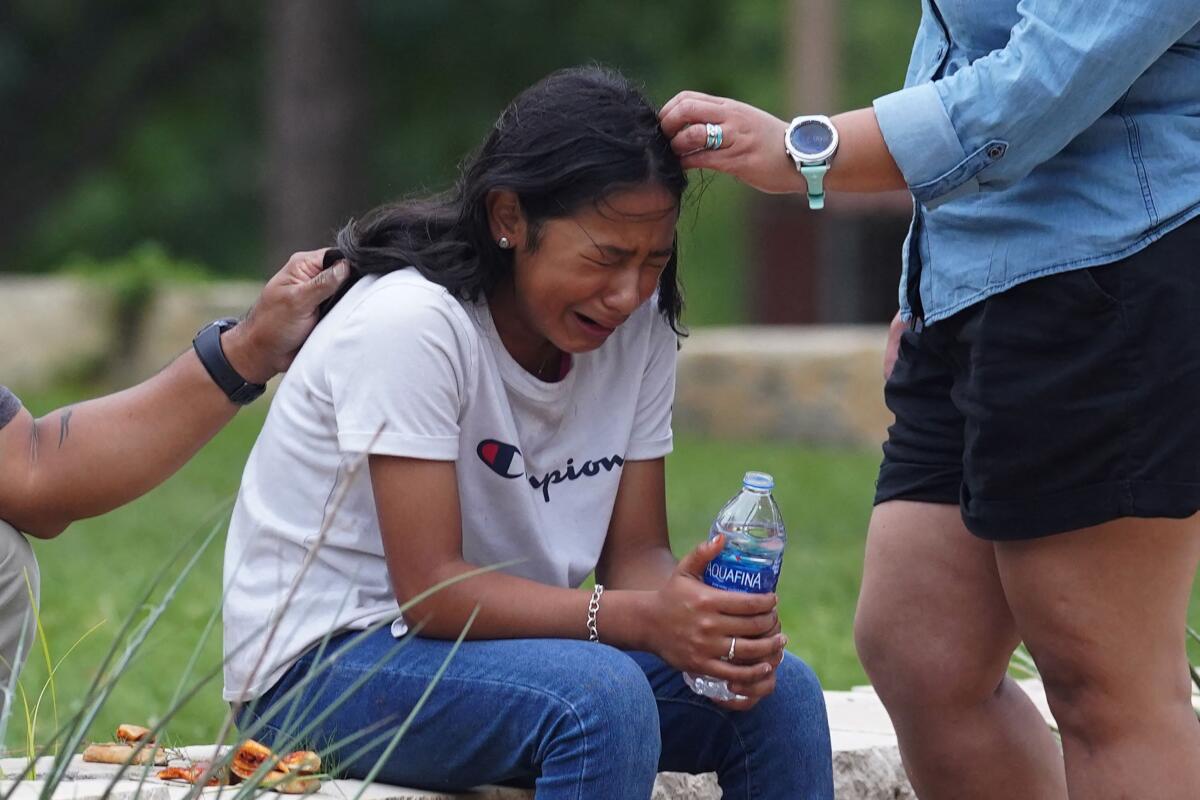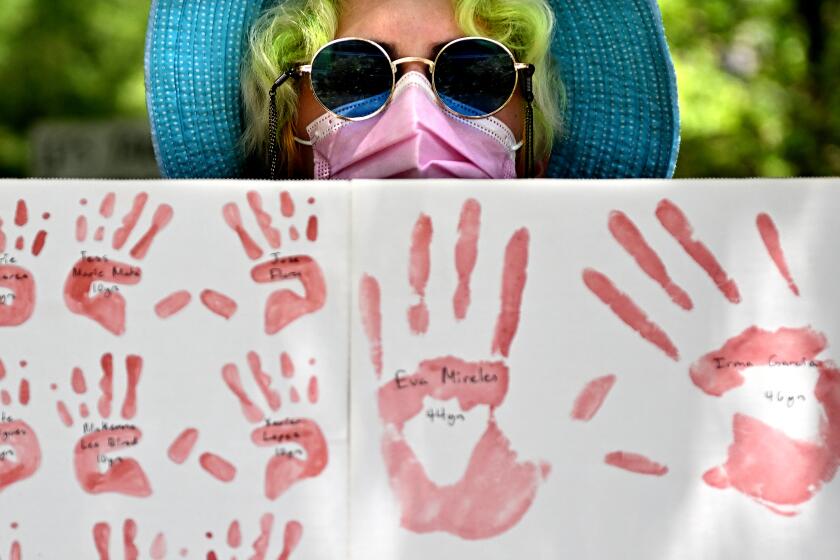U.S. gun laws are getting looser, not stronger, despite more mass shootings

In recent weeks, a string of devastating shootings — at a grocery store in Buffalo, N.Y., a church in Laguna Woods, and now an elementary school in little Uvalde, Texas — has renewed calls for tighter gun restrictions.
Just hours after an 18-year-old gunman killed at least 19 children and two teachers at a Texas elementary school Tuesday, an emotional President Biden demanded: “When in God’s name are we going to stand up to the gun lobby? When in God’s name will we do what we all know in our gut needs to be done?”
Gov. Gavin Newsom, in a series of furious tweets Tuesday, asked, “Who the hell are we if we cannot keep our kids safe. This is preventable. Our inaction is a choice. We need nationwide, comprehensive, commonsense gun safety now.”
Experts, however, say the opposite — the loosening of gun laws — is almost certainly coming instead.
The gunman posted his intentions on Facebook before shooting his grandmother, going to the elementary school and barricading himself in a classroom.
That’s despite the 10 shoppers and grocery workers gunned down in a largely Black neighborhood on May 14. The elderly Taiwanese churchgoers terrorized a day later. The elementary school students shot dead Tuesday.
“If your reaction to these kind of atrocities is, ‘Well, where is the political will to move the needle on regulation?’ the truth is that the space for that kind of regulatory move is becoming narrower and narrower, both as a matter of constitutional law but also as a matter of state law,” said Darrell A.H. Miller, a Duke University law professor and expert on the 2nd Amendment and other gun laws.
By this summer, the U.S. Supreme Court is expected to hand down a decision undoing a long-standing New York law that forbids individuals from carrying guns in public without first demonstrating a “special need” for self-defense.
Depending on how narrowly the court tailors its decision, the ruling could have sweeping implications for similar concealed-carry restrictions across the country and especially in liberal states including California, Miller and other 2nd Amendment scholars said.
If the court issues a broad decision — such as one that implies regulations on guns that aren’t historically based are unconstitutional — even more gun control legislation could become vulnerable to challenges, the scholars said.
“Any day now the Supreme Court could hand down its decision in the New York concealed-carry case and make it much harder for states like California to regulate guns in the name of public safety,” said Adam Winkler, a UCLA law professor.
Miller said that the “trend line is definitely [toward] ever more expansive gun rights,” not gun restrictions, and that there will almost certainly be “a flurry of litigation” from gun rights advocates targeting additional state gun regulation measures once the Supreme Court issues its decision in the New York case.
Gun rights groups have been slowly building toward such an outcome for years, scholars said, and think that the Supreme Court’s conservative majority — bolstered by former President Trump’s three appointees — shares their interests in scaling back gun restrictions nationwide.
At the same time, Miller said, many lawmakers in red states feel emboldened to bolster gun rights now — even in the face of tragedies such as what happened in Uvalde, where two teachers and 19 elementary school children were killed by a gun-wielding 18-year-old who was later shot to death by a law enforcement officer.
Before the school massacre, the black-clad gunman allegedly shot and wounded his grandmother.
“Even absent action by the Supreme Court of the United States, the demonstrated reaction of red states in particular to atrocities like what just occurred in Texas and what just occurred in Buffalo — what was it, last week? — is not to actually reconsider or even consider any sort of gun regulations, but ever more expansive gun rights,” Miller said.
Miller was one of several law professors who filed what’s known as an amicus brief with the high court in the New York case, New York State Rifle & Pistol Assn. vs. Bruen, in which they argued against a far-reaching decision suggesting that any gun regulation not grounded in early U.S. history is unconstitutional.
The case began when two men who live near Albany, N.Y., applied for concealed-weapons permits but were turned down by a county judge who ruled they did not “face any special or unique danger.” They sued, along with the rifle and pistol association, arguing that the ruling violated their 2nd Amendment right to bear arms for self-defense.
Miller said a broad ruling in the plaintiffs’ favor would throw into question a slew of restrictions that the vast majority of Americans approve of, such as restrictions on carrying guns on airplanes or subway cars, or restrictions against domestic abusers carrying firearms.
Miller said the high court’s “championing of this text, history and tradition approach,” which has already been picked up by some judges in the lower courts and “most vociferously by Trump-appointed judges,” would set a dangerous precedent.
“Then everything’s up for grabs,” Miller said. “If the court applies this, you can bet that at least somebody is going to try to challenge the whole swath of regulatory rules that we have, based on the argument that they have no basis in text, history or tradition.”
Joseph Blocher, another 2nd Amendment scholar at Duke’s School of Law who also signed the amicus brief, said that until now, the primary impediments to gun regulation in the U.S. have been political, not judicial.
Frankly, he said, the 2nd Amendment as it has always existed and been interpreted by the nation’s courts is not “the invincible champion” that many on the right purport it to be, but a law that judges have always understood to have limits.
The right to bear arms, the courts have clearly said, “does not extend to all people or all activities or all places,” Blocher said.
Instead, it has been conservative state legislatures refusing to pass gun restrictions, or even passing so-called preemption laws that preclude blue cities within their borders from restricting firearms, that has inhibited regulation in much of the country. “What’s keeping gun laws off the books is not, at least so far, court cases, but rather a lack of political will,” Blocher said.
However, “that could all change” if the Supreme Court overturns New York’s concealed-carry law in broad terms, Blocher said.
If that happens, he said, it “takes off the table the kinds of mainstream gun regulations that the majority of Americans favor.”
It is unclear how broad the court’s ruling will be. During oral arguments, some justices clearly struggled with the potential implications of a broad ruling, pondering what the carrying of guns might mean in places like Times Square, or a football stadium, or a college campus, Blocher said.
However, all signs point to the court expanding the 2nd Amendment — and gun rights for people across the country, scholars said.
Some federal laws, such as the restriction on young adults buying handguns from licensed federal dealers, could come under new scrutiny. State restrictions in more liberal places such as California — against high-capacity magazines, for example, or against certain types of weapons like assault rifles — certainly would be affected, said Winkler of UCLA.
A number of California gun measures have come under scrutiny in lower federal courts in recent years, including the state’s ban on assault-style rifles and its ban on large-capacity ammunition magazines.
While lower courts ruled both unconstitutional, the 9th Circuit Court of Appeals ruled that the magazine ban was a limited restriction on people’s rights and, therefore, constitutional. The decision suggested the appeals court will probably reach a similar conclusion on the assault-style weapons ban.
Gun rights advocates have already said that they want those issues addressed by the Supreme Court and that the highest court’s ruling in the New York concealed-carry case could be relevant to determining the legitimacy of those laws.
Earlier this month, a three-judge panel of the 9th Circuit ruled that another California law barring adults under 21 from buying semiautomatic rifles was unconstitutional. The state is expected to ask for a larger panel of judges on the court to review that decision, and it too could face added scrutiny down the line, the experts said.
“The kinds of laws that are most likely to occupy the court’s time in coming years are the laws in places like California and New York and other liberal states that have gone beyond federal law to restrict guns,” Winkler said.
“The Supreme Court is in the midst of erecting barriers to doing anything” to regulate guns, he said, “and it may be that the court is going to leave us with few options other than, well, I guess we’re going to have to start arming teachers now.”
More to Read
Get the L.A. Times Politics newsletter
Deeply reported insights into legislation, politics and policy from Sacramento, Washington and beyond. In your inbox three times per week.
You may occasionally receive promotional content from the Los Angeles Times.












